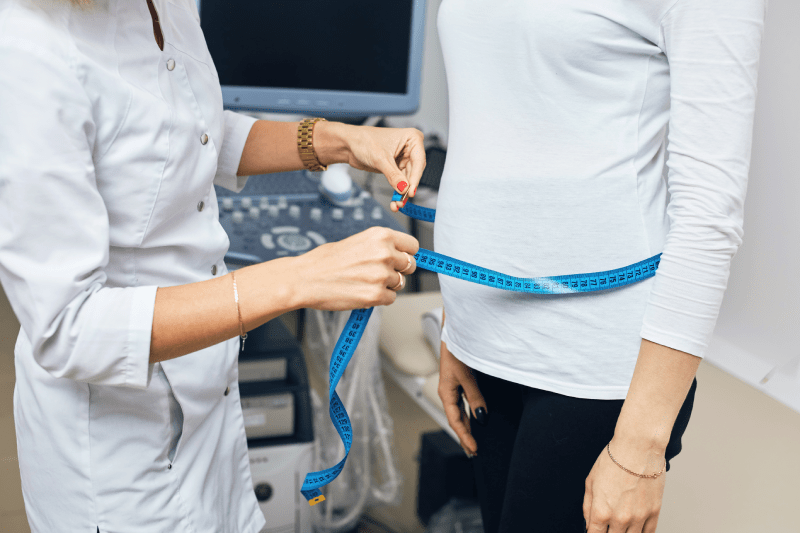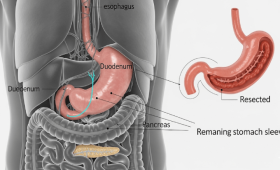What Are Gastric Sleeve Packages Including Flight Tickets?
Gastric sleeve packages including flight tickets are comprehensive health tourism offers where, in addition to the patient’s surgery and accommodation costs, the round-trip flight expenses from the patient’s country of residence to Turkey are also covered or organized up to a certain limit.
These packages aim to simplify the logistics of the treatment process for international patients. They generally cover economy class flights and include all transfer services to ensure the patient travels comfortably. By doing so, patients are relieved of the extra burden of travel organization, allowing them to focus entirely on the treatment process and their recovery without any unnecessary stress.
Why Is The Cost Of Sleeve Gastrectomy In Turkey More Affordable Compared To The West?
The main reasons why the cost of sleeve gastrectomy in Turkey is more affordable are the significantly lower general operating and personnel costs in the country, especially compared to Western Europe and North America. Furthermore, strong competition in the healthcare sector and government incentives for health tourism push prices down. However, this cost advantage does not mean a compromise on the quality of the medical technology used or the surgeon’s experience. On the contrary, many hospitals hold international accreditations and provide services in modern, state-of-the-art facilities, ensuring high standards of care are maintained throughout the process for all international guests.
What Services Does The Surgery Package Cover Besides Flights?
A standard sleeve gastrectomy package covers a wide range of services beyond flight arrangements. These services typically include; all necessary pre-operative medical tests and consultations, the surgical operation fee, anesthesia, accommodation and care during the hospital stay, a personalized diet program provided by a nutritionist, and all airport/hospital/hotel transfers. Additionally, some packages include specialized translator and companion support for international patients, making the entire treatment process much more comfortable and reducing anxiety for individuals traveling alone.
Do Hospitals In Turkey Comply With International Standards?
Most obesity surgery centers in Turkey maintain high-quality and safety standards to be able to admit international patients. Many large hospitals are accredited by global accreditation organizations such as the Joint Commission International (JCI). These accreditations indicate that the hospital environment, medical devices, and surgical protocols applied comply with international safety and quality norms. Turkish surgeons have international experience in their field and utilize the most modern laparoscopic techniques, ensuring the best possible outcome and patient safety.
What Is The Minimum Body Mass Index (BMI) For Sleeve Gastrectomy?
The generally accepted minimum Body Mass Index (BMI) criterion for sleeve gastrectomy varies depending on whether the patient has serious obesity-related co-morbidities. Typically, a BMI of 35 and above is accepted for patients with at least one co-morbidity (such as Type 2 diabetes, high blood pressure, or sleep apnea). For those without co-morbidities, the criterion is generally a BMI of 40 and above. However, in recent years, surgery may be considered even for patients with uncontrolled Type 2 diabetes whose BMI is between 30 and 35.
Is A Pre-Operative Liver Shrinking Diet Mandatory?
Yes, the pre-operative liver shrinking diet is mandatory for most patients and plays a critical role in increasing the safety of the surgery. This diet usually lasts 2-3 weeks and involves high-protein, low-carbohydrate, low-calorie liquid-based nutrition. The main goal is to reduce the fat content around the liver and shrink the liver itself. When the liver shrinks, it becomes easier for the surgeon to access the stomach with laparoscopic instruments and perform the operation more safely and efficiently, minimizing surgical risk.
How Many Days Does The Surgery Process Last In The Hospital?
The duration of the hospital stay for sleeve gastrectomy usually ranges between three to four days, including the day of the operation. During this time, the patient’s pain is managed, they are closely monitored for early complications, and their tolerance for liquids is tested. You will receive detailed nutritional training from a dietitian before being discharged from the hospital. This period is set to ensure the patient’s initial recovery and plays an important role in minimizing the risk of complications, providing peace of mind.
How Are Flights And Transfers Organized?
Since flight and transfer organization is included in the package, it is entirely coordinated by the health tourism company. The patient’s flight dates are determined, tickets are purchased, and they are met at the airport upon arrival according to their flight schedule. All transportation along the hotel/hospital/airport route is provided with special VIP transfer vehicles. This seamless logistical support prevents you from experiencing stress related to navigating or transportation in a foreign city, allowing you to dedicate all your energy to recovery.
How Long Does Post-Operative Pain Last And How Is It Managed?
Since sleeve gastrectomy is performed using the laparoscopic method, the post-operative pain is less severe compared to open surgery. Pain usually peaks within the first 24-48 hours and is controlled by strong painkillers (generally administered intravenously) regularly throughout your hospital stay. Oral pain relievers will also be prescribed for you to use for a few days after discharge. Most patients reach a comfortable level to perform their daily activities within one week, though full recovery takes longer.
What Is The Long-Term Success Rate Of The Surgery?
The long-term success of sleeve gastrectomy depends on how committed the patient is to lifestyle changes. Statistically, patients generally lose %60 to %70 of their excess weight permanently. Success is not only measured by weight loss but also by the improvement rate of obesity-related co-morbidities (diabetes, hypertension). To sustain success, lifelong regular follow-up, vitamin supplementation, and strict adherence to healthy eating rules are absolutely necessary, turning new habits into permanent lifestyle changes.

How Many Days Should I Plan For The Travel Period?
The total time you need to stay in Turkey for the sleeve gastrectomy and recovery process is generally planned to be between five to seven days. This period includes one day for pre-operative consultations and tests, three to four days for the hospital stay, and one or two days of hotel accommodation for final rest and checks before the flight home. This duration is set as a minimum to ensure your early post-surgical recovery and safety for flying are adequately secured.
When Can I Return To Work After Surgery?
The time it takes to return to work varies depending on the type of work you do. Patients working in desk-based or light jobs that do not require physical exertion can usually return to work two weeks after the surgery. However, if your job involves heavy lifting, bending, or intense physical activity, it is recommended to wait four to six weeks to allow your body to fully heal and minimize the risk of abdominal hernia. Following your surgeon’s advice on this matter is the safest approach.
What Age Range Of Individuals Are Suitable For Surgery?
The generally accepted age range for sleeve gastrectomy is between 18 and 65 years old. However, these limits are not absolute. Adolescents under the age of 18 with serious obesity-related health problems may be operated on as an exception by the decision of a multidisciplinary board. Similarly, patients over 65 years old may also be found suitable for surgery after their general health status, anesthesia risks, and co-morbidities are carefully evaluated. The final decision is always based on an individual assessment.
What Medical Tests Are Performed Before The Surgery?
The medical tests performed before the surgery are mandatory to fully determine the patient’s suitability for surgery and anesthesia. These tests typically include; complete blood count, kidney, liver, and thyroid function tests, detailed vitamin and mineral levels, ECG and cardiac evaluation, chest X-ray, and endoscopy (to examine the inside of the stomach). Endoscopy is vital to check for any ulcers or similar conditions in the stomach that could prevent the surgery from proceeding safely.
How Are Flight Tickets Secured And Their Costs Covered?
Flight tickets are secured by the health tourism company according to the patient’s travel plan. The costs are generally included in the package price up to a certain budget limit. If the patient’s flight cost exceeds the limit specified in the package, the patient pays the difference. The organization usually adjusts the departure and return dates to optimize the hospital stay and rest periods, prioritizing the patient’s comfort and safety at all times during the arrangement process.
How Much Weight Loss Is Expected In The First Year After Surgery?
The most intense weight loss after sleeve gastrectomy usually occurs within the first 12 to 18 months. Patients lose a significant portion of their excess weight during this period. The rate of weight loss depends on the patient’s starting weight, age, metabolism, and adherence to diet/exercise discipline. A rapid drop is seen in the first 6 months, after which the rate slows down, and weight loss stabilizes as it enters the plateau phase. Patience and discipline are the keys to this fast and permanent change.
How Is The Risk Of Weight Regain Prevented?
There is a risk of weight regain after sleeve gastrectomy, and this risk usually arises from long-term non-adherence to nutritional rules. To prevent the risk; lifelong regular follow-up, continuous communication with a dietitian, regular use of prescribed vitamin supplements, and regular physical activity are essential. In particular, high-calorie liquid foods, sweets, and frequent snacking are the most common causes of weight regain. Patients must make a healthy lifestyle a permanent habit for the procedure to remain successful.
Are Vitamin And Mineral Supplements Required After Surgery?
Yes, the use of lifelong vitamin and mineral supplements is absolutely necessary after sleeve gastrectomy. Due to the reduced size of the stomach, adequate nutrient absorption from food becomes difficult. This can lead to deficiencies in vital nutrients such as B12, iron, calcium, and Vitamin D. Your doctor and dietitian will determine a personalized supplement regimen suitable for you based on your blood tests. The regular use of these supplements is vital to prevent serious long-term health problems.
Which Foods Must Be Strictly Avoided After Surgery?
The most important foods that must be strictly avoided in the post-operative period are carbonated and sugary drinks (they bloat the stomach and trigger reflux), high-sugar foods (they increase the risk of Dumping Syndrome), and “sticky” foods like white bread and rice that can clog and swell the stomach. Additionally, fried foods, tough and dry pieces of meat, and alcohol should be avoided. These restrictions support the healing of the stomach and maximize weight loss by keeping calorie intake under strict control.
How Is Accommodation Provided After The Hospital Stay?
The accommodation required for final rest and checks before the flight, after being discharged from the hospital, is generally provided within the package at contracted luxury hotels. These hotels are located close to the hospital and offer all the necessary amenities to ensure your recovery process is comfortable. The accommodation period is typically planned as 1-2 days, and during this time, patients relax and gather their energy in a comfortable and peaceful environment, preparing for their return journey.
Is There Translator Support During The Treatment Process In Turkey?
Yes, health tourism institutions in Turkey provide professional translation services to ensure that international patients do not experience any communication issues during the treatment process. A patient coordinator or translator assigned to the patient is present during hospital appointments and consultations with the doctor and dietitian. This support ensures the patient correctly and completely understands medical information, can easily ask questions, and feels secure throughout their stay.
Is Hair Loss Experienced After Surgery And How Does It Resolve?
Yes, hair loss after sleeve gastrectomy is a quite common and temporary condition, usually due to rapid weight loss and the surgical stress experienced by the body. This shedding generally begins 3 to 6 months after the surgery. To minimize hair loss and speed up its resolution, it is important to pay close attention to protein intake and regularly use supplements like zinc, iron, and B vitamins recommended by the doctor. The shedding usually stops naturally after 12-18 months.

What Are The Potential Risks Of Sleeve Gastrectomy?
The potential risks of sleeve gastrectomy include infection, bleeding, and anesthesia-related risks, as in any surgical procedure. However, the most significant risk specific to sleeve gastrectomy is staple line leak. The risk of leakage is rare but serious and usually occurs within the first few days after the surgery. With modern surgical techniques and close monitoring in the hospital, these risks are minimized, and any potential leak can be detected and treated promptly.
When Can I Drive A Car After Surgery?
The time to start driving a car after surgery should generally be after you have stopped using strong pain relievers and feel comfortable enough to make sudden movements. Most patients can start driving for short distances about one week after the surgery. However, you must be certain that your ability to brake suddenly or turn the steering wheel quickly in an emergency is fully restored. It is important for safety to avoid driving until the sedative effects of pain medications have completely worn off.
Do Obesity-Related Diseases Improve After Surgery?
Yes, one of the greatest benefits of sleeve gastrectomy is the dramatic improvement it provides in co-morbidities associated with obesity, such as Type 2 diabetes, high blood pressure, and sleep apnea. Rapid weight loss after surgery and the reduction of the Ghrelin hormone increase the body’s insulin sensitivity. This enables a large proportion of Type 2 diabetes patients to reduce or completely stop their medications. The surgery results in not only weight loss but also the correction of general metabolic health.
How Many Days Must I Stay In Turkey Before The Surgery?
To complete all necessary tests and preparations before the surgery, and to have final consultations with the surgeon and anesthetist, it is usually sufficient to arrive in Turkey one day before the operation. This provides adequate time to recover from travel fatigue and allows for all necessary medical approvals to be obtained at the last minute. Health tourism packages usually support this single day of early arrival with hotel accommodation, making the process more comfortable for the patient.
How Does The Long-Term Follow-Up Process Work?
The long-term follow-up process is generally planned to occur at 3, 6, 9, and 12 months in the first year, and then once a year thereafter. After you leave Turkey, these follow-ups are usually conducted remotely (online consultations). During these check-ups, weight loss progress is monitored, blood test results are evaluated, vitamin supplements are adjusted, and your eating habits are reviewed by a dietitian. This lifelong follow-up system is vital for the sustained success of the surgery.
Which Cities Are Most Preferred For The Surgery?
The most preferred cities in Turkey for obesity surgery are large metropolitan areas like Istanbul, Izmir, and Antalya. These cities have developed health tourism infrastructures, multiple international airports, and a large number of accredited hospitals with experienced surgeons. Istanbul offers the widest range of options, while other cities may provide a more peaceful environment for patients who want to combine the recovery process with a holiday. The choice typically depends on the package scope and the patient’s comfort expectations.
Is Psychological Support Necessary After Sleeve Gastrectomy?
Yes, sleeve gastrectomy entails not only a physical but also a profound psychological transformation process. Severing the old emotional relationship with food can cause adaptation difficulties, emotional fluctuations, or issues adjusting to the new body image in some patients. Therefore, seeking support from a psychologist or counselor in the post-operative period is often advised and important for managing emotional eating behaviors and making new, healthy habits permanent.
Is The Surgical Technique Laparoscopic (Keyhole)?
Yes, sleeve gastrectomy is generally performed using the laparoscopic (keyhole surgery) technique nowadays. This means that instead of a large incision in the abdomen, only a few small incisions (approximately 0.5 to 1 cm) are made. The laparoscopic method is less invasive, which results in less pain for patients, a shorter hospital stay, faster recovery, and smaller, more cosmetically acceptable scars, significantly enhancing the overall patient experience.
When Can I Start Exercising After Surgery?
The process of starting exercise after surgery must be gradual and controlled. Patients can begin light walking immediately after discharge. However, strenuous sports like intense cardio, abdominal exercises, or heavy lifting that could put pressure on the internal stitches must be strictly avoided for at least four to six weeks. After the sixth week, it will be safe to gradually transition to more intense exercises and weight training with the surgeon’s full approval.
Is It Possible To Reverse Or Convert The Surgery?
Sleeve gastrectomy is an irreversible procedure because the stomach is cut and removed. However, in very rare cases where insufficient long-term weight loss or severe reflux occurs, the existing sleeve may be converted to another bariatric surgery, such as Gastric Bypass or SADI-S. These conversion surgeries are usually considered a last resort after a comprehensive evaluation, typically several years after the initial operation, to address ongoing issues.
What Is The Price Advantage Of The Package Including The Flight Ticket?
The main price advantage of packages including the flight ticket is that they eliminate surprise costs and consolidate all logistical burdens into a single price. Even if patients tried to organize the flight ticket in their home country, they would have to separately organize additional services such as airport transfers, hospital transfers, and accommodation. The package offers all these services collectively and at a discounted rate, saving both time and often making the total cost more economical than individual bookings.
Can Reflux Problems Occur In The Long Term?
Yes, some patients may experience long-term reflux (heartburn) problems after sleeve gastrectomy, or existing reflux may worsen. This is associated with the change in the shape of the stomach and increased pressure within the stomach. Reflux can usually be managed with medication (PPIs). However, in cases of severe reflux unresponsive to medication, a surgical conversion (e.g., conversion to Gastric Bypass) may rarely be necessary. Regular follow-up and adherence to diet rules are essential for managing the risk of reflux effectively.

Is It Possible To Convert From Band Surgery To Sleeve?
Yes, for patients who have previously had Gastric Band surgery but are experiencing problems such as band slippage, erosion, or inadequate weight loss, the removal of the band followed by a conversion to Sleeve Gastrectomy is a common and safe procedure. This is considered a two-stage surgery, and a waiting period may be necessary for the stomach to heal after the band is removed. Conversion surgeries offer an effective second chance in cases where the initial operation was unsuccessful in achieving the desired results.
Must Smoking And Alcohol Consumption Be Stopped Before Surgery?
Yes, smoking and alcohol consumption must be stopped absolutely and immediately before the surgery. Smoking significantly increases surgical risks (especially infection and wound healing problems) and elevates the risk associated with anesthesia. Alcohol is high in calories and can also negatively affect the healing of the stomach after surgery. Surgeons strictly mandate that smoking be stopped at least 4-6 weeks before the operation, and alcohol even longer, to ensure the safest possible surgical environment.
Is A Companion Required During The Accommodation Period?
Having a companion during the accommodation period is not mandatory but is highly recommended. The presence of a companion to support you in the hospital, especially during the first 24-48 hours after surgery, and to provide emotional comfort, is important. If you do not have your own companion, health tourism packages can offer the service of a professional, multilingual companion or nurse for a certain period for a fee. This will make your recovery process safer and more comfortable.
I hope these detailed questions and answers have clarified everything you wanted to know about gastric sleeve surgery packages, including flights, in Turkey.
The health tourism process can be complex, so the best step is to contact experienced organizations like Cure Holiday who will provide professional support for every step, from your travel to surgery, recovery, and long-term follow-up. They will assist you with personalized packages and the most up-to-date pricing.
Which specific question related to this journey would you like to focus on more deeply before proceeding?



